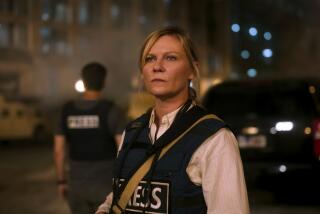Revolution, revelation
- Share via
AH, the romance of fighting for a cause. Remember the Spanish Civil War, that heroic conflict between leftists and fascists that so entranced the 1930s mass media and served as an opening act for the great European clash to come?
But as Spanish writer Juan Eslava Galan shows in his sly, Fellini-esque novel, “The Mule” (Bantam: 294 pp., $12 paper), war is a decidedly different experience for conscripts on the ground. Consider Juan Castro Perez, a stable boy drafted by the Republican government to fight Generalissimo Francisco Franco and his nacionales. A year into the fighting, Castro switches sides and is pressed into service as a “muleteer,” shuttling munitions and other supplies across rocky terrain to the ever-shifting front line.
All Castro can think of is La Quinteria, his Andalusian home, his father, jailed by the Republican “reds,” his now-impoverished mother and sisters. When Castro spies a mule in the brambles, he hides her among his 24 beasts of burden and dreams of bringing “Valentina” home to work land that his aristocrat master may give him in gratitude for serving Franco.
Life and war have more immediate plans: The unarmed Castro encounters nine “reds” fleeing a skirmish who ask to surrender. They even give him their Soviet submachine guns. Thanks to a dilettante journalist sent to find an inspirational story, the grimy, lice-bitten naif finds himself lionized as a national hero by Franco himself. Women swoon, he has pesetas to spend. He sees what life is like for the masters of war and begins to imagine an even better future.
In this surreal and cinematically rendered tale, translated from the Spanish by Lisa Dillman, the bishops, generals and aristocrats inhabit an alternate reality to that of the grunts who fight for them. And a pencil-pusher who hasn’t fired a single shot can decide a hero’s fate.
--Kristina Lindgren
More to Read
Sign up for Essential California
The most important California stories and recommendations in your inbox every morning.
You may occasionally receive promotional content from the Los Angeles Times.













